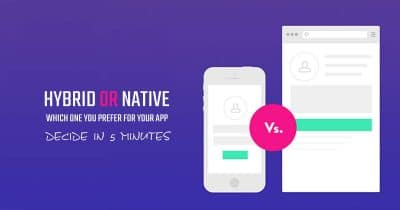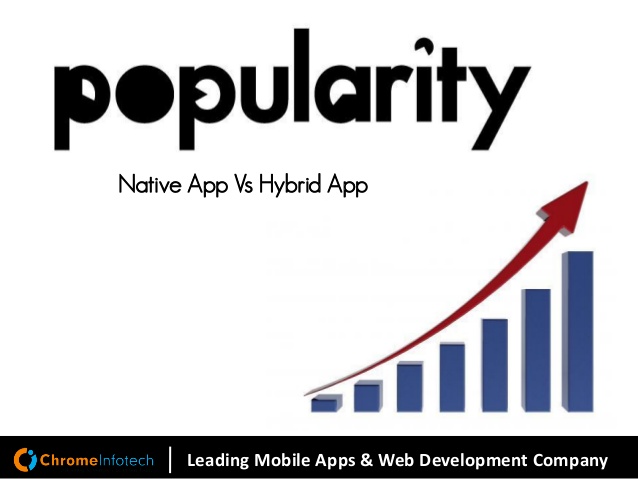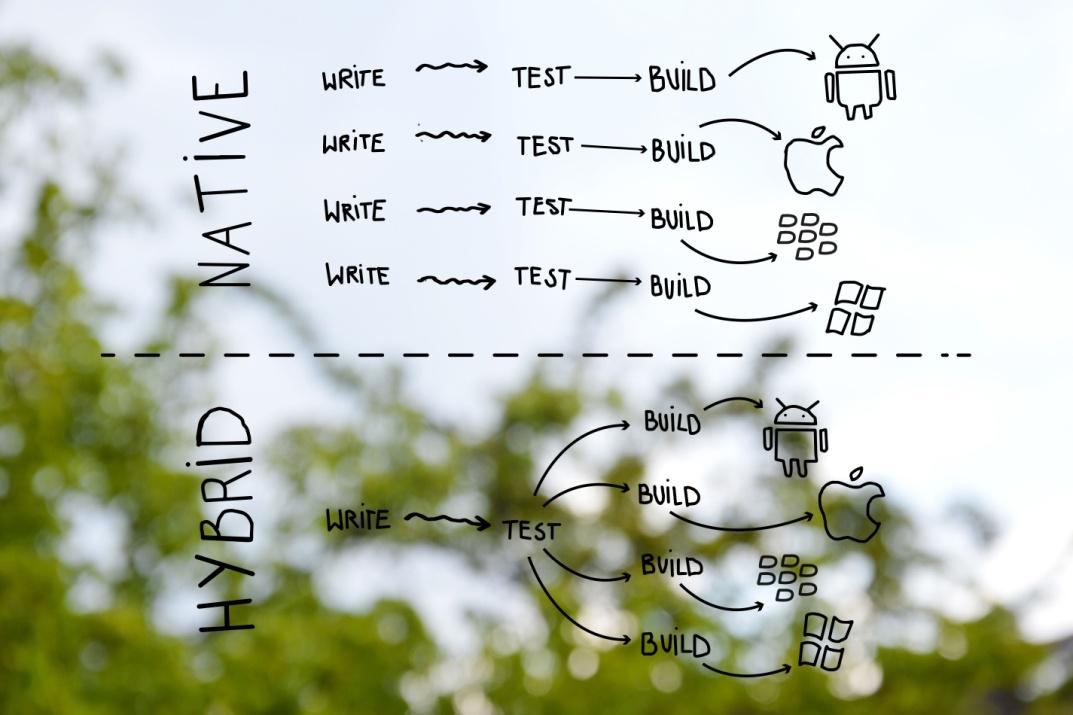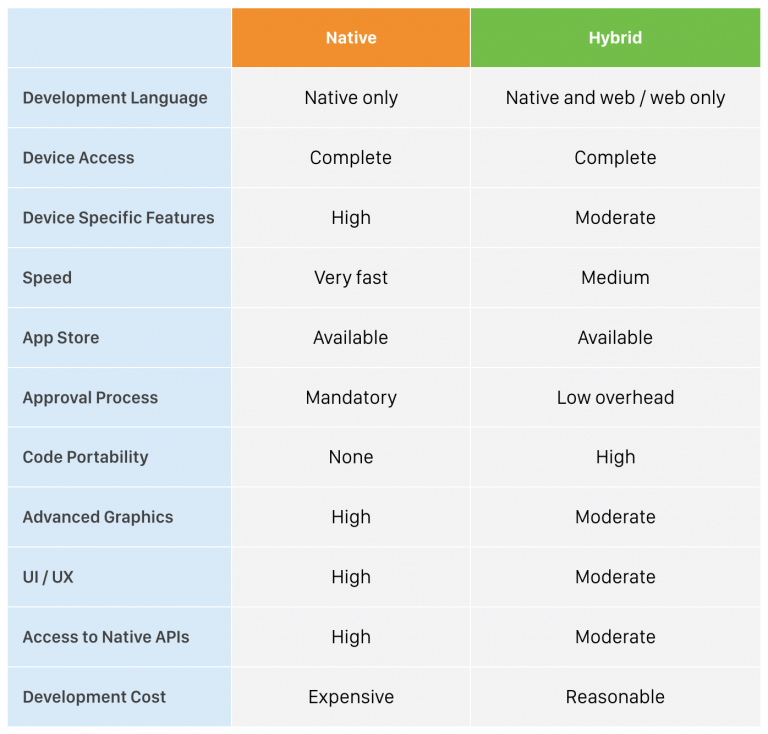The engaging world of Application Development seems highly exciting but in actuality, it is a web of confusion! And the strings to this web start building up with the very first confusion of opting for a Hybrid or Native App Development?…Actually, there is no definitive answer to this query however, you can make the fog somewhat clear by reviewing the competing factors of both processes.
Your decided budget and the project deadline can also play a major role in deciding things for you. The motive of this blog is to provide you with a crystal clear understanding of Hybrid and Native App Development technologies so that you can take your call regarding which mode of development is best for your application.
Before moving ahead, let’s have a quick session on Application Development process. Application development is something which every other organization is into, but the best output is only delivered by few.
The key to their success lies in the deep analysis they dive into before jumping on to an app development. Below are the highlights that must be considered and laid focus on before developing an application:
- Deep Market Research
- Serving something Unique
- Knowing your Target Audience
- Deciding your Budget in advance
- Rating the App correctly
- Ensuring your Idea’s Efficiency
A crystal clear understanding of the basic roots can make further processes sound easier and simpler.
As per my knowledge, there are more than 7,50,000 apps in the Play Store; 9,50,000 apps in iOS Store and around 2,00,000 apps in Window’s phone. Keeping a close eye on every single app to decide which is best is next to impossible, thus pulling you back from where we actually started. However, few points of comparison may help in solving your grounds of confusion. Here, we go…
Jump to Section
Know the Basics
Choosing between Native or Hybrid application is a tough one. However, before clearing thoughts over this subject let’s find out what does Native and Hybrid actually means?
Native Apps
Native Apps are built for a specific operating system and can be accessed from a dedicated app store. As it is a specific platform, hence requires specialized and unique expertise. It is generally regarded as an expensive and time-consuming process.
The Native app building process for iPhone will code in Swift, Objective C or X-Code while; for Android users, it will be developed using Code in Java, Android Studio or Kotlin. This platform is believed to drive larger app capabilities and great user experience, but its specific requirements may take a longer time to develop.
Hybrid Apps
Hybrid Apps are generally web applications which contain a web view within the framework of the Native app. They look and feel just like Native apps, but they are rooted on company’s website. These are designed using Java Script and HTML5.
The best thing about this particular type is that it can be deployed across multiple platforms and usually arises as the cheaper and faster solution for app development. These applications hold the ability to run on your mobile and they do have access to the device’s GPS and camera features. In short, when a Hybrid app is developed, it is first compiled, thus transforming a web application into a native app.
How can you be Benefited from Native and Hybrid?
Any investment requires a proper investigation. So, before taking a further step, it is advised to take a dive into the advantages and benefits of Native and Hybrid apps.
Advantages of Native App Development
- Have better User Experience
- Ability to render Data and Graphics at a High Speed
- Match on to the platform specific user interface standards
- Pro at its Functionality
- Includes core features within its Operating System
- Has exposure to both Google Play and App Store
- Has easier access to built-in capabilities
- Involves Separate Code for each platform
- Can be accessed in Offline mode
- Offers the best Performance
- Guarantees best Security features
- Offers more Monetization Opportunities
Things do not end over here as there is also an other side to the coin…
Advantages of Hybrid App Development
- Faster to Access
- Involves Simple app development process
- Less Expensive than Native developers
- Easier to scale on another platform
- Offers Portability
- Access to various software/hardware capabilities through plug-ins
- Saves Time & Money
- Easy to Develop & Maintain
- Can be used both the platforms
- Offers more Monetization Opportunities
- Requires the use of Single Language for all platforms
- Addition of Additional platforms can be done with one line of code
Are there any Drawbacks too?
Well Yes! Because everything holds pros and cons for the same. If Hybrid App saves time, then Native App offers core features within its operating system. So in a way, if something holds any kind of advantage, then there is also a possibility of having few disadvantages attached to it.
Without falling into the prey of going through only goody-goody features, let’s also have a look at the drawbacks associated with both processes.
Disadvantages of Native App Development
- Have to manage a code base for each platform
- Generally costs more than Hybrid Apps
- Here iOS apps will not run on Android and Android apps will not run on iOS
- To create an app on both platforms, two separate developers will be required
- Involves hard development process
Also, have a look at the…
Disadvantages of Hybrid App Development
- Sounds low on Performance as Hybrid apps load in Webview
- The User Experience of the app suffers a lot
- Lacks the genuine platform specific user experience
- Developers lose access to the usage of core device features and built it capability
- Does not meet the standards of providing high app efficiency
Keys to your Inquisitiveness upon deciding which Methodology to use?
After analyzing the advantages and disadvantages of Hybrid and Native apps development, things seem to emerge in a more clear manner. But the big question of choosing between Hybrid or Native app development still remains there.
I think, the list of few more questions can really help you with your inquisitiveness or can atleast take you a step towards solving your curiosity. Hence, answer honestly!
1. Do you want to go for the use of Native features in your app?
Developing your application on the Hybrid mode may or not provide you with Native features. There are many frameworks available in the market for the development of the Hybrid app and the adoption of these frameworks actually depend on the needs and requirements of the app, hence, getting the taste of Native in a Hybrid mode is not always mandatory.
Native apps have the licensed access to SMS, Camera, Contacts, Push Notification, Map, Hardware Device Buttons, however, these are not limited to Native only as some of these can be used while the development of a Hybrid app by pulling the Native components separately.
In case, you are looking for the access to core features and specific platform, then Native is definitely the answer.
2. How eagerly you want to Launch your App in the Market?
Every organization has its own Marketing Strategy and a set time for its app launch. After analyzing the number of features involved in your application and the number of resources required to accomplish that task, one can easily decide and announce the launching date of his application.
If you are in need of making your application live in the market ASAP and obviously if you have a free budget size, then choose Native without any second thought. But if things are not so favorable and you are in need of launching your app with a limited budget, then Hybrid is the appropriate choice for you.
More resources will lead to the automatic increase in your budget and Native will not go with such situations. The Hybrid approach can make you launch the application on multiple platforms that too in a short span of time and obviously in your set budget.
3. Do you Own a Separate Budget for Developers in Android and iOS?
In case, you hold the ability of owning a separate budget for Android and iOS development resources and a hell lot of time for your app’s market launch, then do not think twice before investing in a Native Application development. The best thing about going with Native is that you can make specific and detailed upgradations to your specific platform.
However, if you are looking for the advantage of developing your application both on Android and iOS platforms, then Hybrid is the key to your door of success. The development cost may drop down here, but it may cost you high when you are in need of integrations to fill the gap in your later stages of App’s success.
4. Do you need to Update your Mobile App? If Yes, then how often?
An application does require upgradations at certain levels. If you need to make time-to-time updates to your designed application without making your users feel annoyed, then the development of Hybrid app must be considered. It actually makes you update your content directly from the web, unless and until your application requires an integral change in its functionality.
This can be laid as the basic reason for most of the Media related firms and Banks to go for the development of a Hybrid application. This platform allows you to work out of a single code base thereby, making the teams work in a more efficient manner.
5. Are you in for providing the Best User Experience?
Well, let me guess…it’s a YES! Isn’t it? Then, choose Native! The user experience provided after the development of an application using a Native approach remains unmatched despite the other advantages offered in a Hybrid approach.
This however, does not mean that the user experience offered in Hybrid approach is disappointing but, it’s just that the Hybrid UX may not matches up to the level of Native UX. A Hybrid app good front-end developer can get close to the Native experience, but then again it actually depends on its application interface.
The scrolling feature of Hybrid approach may fail to satisfy your expectation in terms of smoothness. Browser based applications generally face challenges with functionality, features, experience, and scrollability.
These are few grounds of interrogation that must be faced by a business before going with the choice of developing your application on a Hybrid or Native mode.
Hybrid versus Native…A Quick Glance!
A good decision is based on various factors that must be considered before going to a final decision. When you set up yourself to design the best Mobile Application for your target users, then you must try to come across as fewer obstacles as you can.
If you opt for Native, then you are sure to explore wide features and better user experience whereas; if you go for Hybrid, then you can get a quick app development in a limited budget. Below are quick glances of both platforms so that you can take a wise decision based on your requirements:
Things may seem and appear easy when it’s not at our head. Hence, it is advised to pen down the requirements your application is in need of and only then proceed further. Taking a wise and smart decision will bring fruitful results for your business in the long run.
What’s Best?
There are advantages and disadvantages for both Native and Hybrid approaches and hence, it is necessary to provide equal attention to both the terms. Cross-Compatible Web Technologies, Speed to Market, Easy Updates, One Source Code, Low Budget Costing and Availability of Resources make Hybrid Applications look cool and pleasing.
However, in the long run, the firm may need to spend more time on fixing and tweaking the application may be because of performance issues or either of user complaints. On other hand, the Native approach may take time in development and requires a huge amount of investment.
In the end, I would only like to say that each approach has its pros and cons but this vision depends wholesomely on the foundations of your needs and requirements. So, it is advised to plan your decision after having a rigorous round of questionnaire and analysis of your idea, its requirements and your budget.
- LinkedIn Scraper | LinkedIn Data Extractor Software Tool - February 22, 2021
- Is Web Scraping Legal? - February 15, 2021
- What Is Data Scraping? - February 10, 2021





